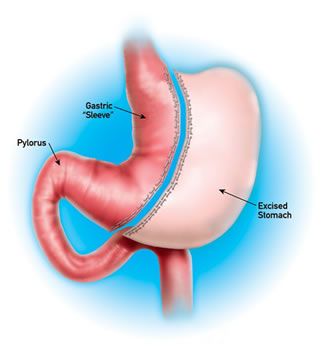01 Aug Laparoscopic Sleeve Gastrectomy
Sleeve Gastrectomy is now becoming the most popular bariatric procedure in the United States and is the fastest-growing operation in the field of General Surgery. Currently, Sleeve Surgery is the most frequently chosen bariatric operation among Dr. Ahmad’s patients.
Dr. Anoosh has performed hundreds of sleeve gastrectomy procedures with zero mortalities and one of the lowest complication rates in the United States.
Sleeve gastrectomy is a restrictive form of bariatric surgery that shrinks the stomach to approximately 15% of its original size. It is commonly performed on severely obese patients who are not healthy enough to undergo a successful gastric bypass, biliopancreatic diversion or similar major surgery. The procedure enables rapid weight loss with fewer complications than the more conventional weight loss surgeries, but its effectiveness loses stride because there is no intestinal bypass.

The actual sleeve gastrectomy procedure is quite simple and begins with the surgeon’s tools entering through a small incision made in the abdomen. The stomach is then stapled down and “re-sized” over a long tube, greatly reducing its volume. Once this newly re-sized stomach or “sleeve” is examined for quality and to ensure no leakage or bleeding, the excess stomach tissue is then excised. The direct removal of stomach tissue also has a secondary metabolic effect by reducing the secretion of the hormone Ghrelin, which is responsible for inducing hunger. The lining of the stomach is one of the few areas of the body to actually produce and secrete Ghrelin, most of which is removed during the procedure.
The Next Step
Your next step is to register to attend one of Dr. Ahnoosh’s next free informational seminars. At the seminar, Dr. Anoosh will discuss each of the procedures he offers, along with the features and advantages that differentiate us from other Bariatric Facilities on Long Island. We are delighted to welcome you to Dr. Farhad Anoosh’s Bariatric Center of Excellence practice , where he has helped thousands of patients improve their health and well-being and reclaim their lives over the last 10 years that he has been practicing Bariatric surgery. Please register for our next seminar below.
Risks and Complications of Sleeve Gastrectomy
As with any surgery, there are inherent risks to undergoing sleeve gastrectomy. Specific to bariatric surgeries, including the sleeve gastrectomy, is the risk of leakage and bleeding. Although the newly formed stomach sleeve generally fares well while it heals within the body, leakage and bleeding may occur from suturing or re-approximation of the new stomach before concluding the surgery. Due to drastic change in the size of the stomach, a patient may over ingest food so severely that is can cause a disruption to the newly formed stomach and may exacerbate these conditions. Additionally, the narrow size of the stomach may be vulnerable to large chunks of poorly masticated (chewed) food getting stuck, causing discomfort and pain to the patient.
Advantages and Disadvantages of Sleeve Gastrectomy
The following is a list to summarize the pros and cons to sleeve gastrectomy in comparison to other bariatric techniques:
Advantages:
• No malabsorptive complications or related deficiencies
• No risk of ulcer
• Gastric dumping syndrome is largely avoided
• Normally laparoscopic, reducing recovery time
• Removes gland that secretes Ghrelin, hunger hormone
• No foreign bodies (bands, tubes etc) permanently inside body
• No “tightening” needed for further weight loss
Disadvantages:
• Overall less effective than Gastric Bypass in weight reduction and maintenance.
• Irreversible


